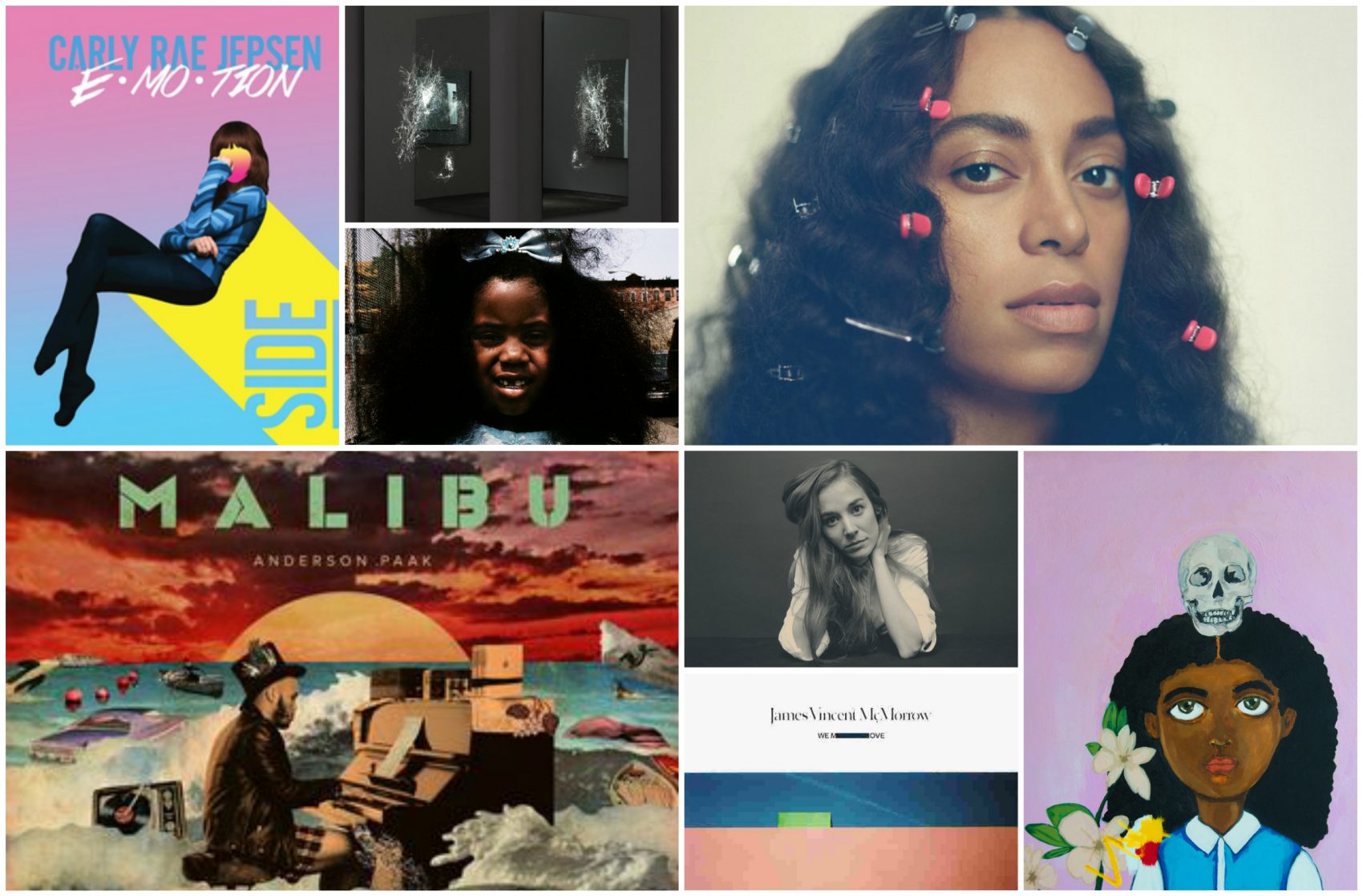Advertisement
Our 10 Favorite Pop-ish Albums Of 2016

Each of the albums on this list — nine LPs and one EP, arranged alphabetically — exists in a world all its own. All deal in the dark fundamentals of the human condition: loss, anxiety, pain. A few offer political resistance. Some traffic in escape, others confrontation. Taken together, it is striking how much hope they have to offer.
Anderson .Paak, "Malibu"
"Malibu" is the third full-length effort from California emcee/singer/producer Brandon Paak Anderson, aka Anderson .Paak. On “Malibu,” Anderson moves effortlessly between singing and rapping, and with his buttery rasp he manages to sound both intimate and bold. “Malibu” is, more than anything, an exercise in sensuality. The album’s production, which nods to old-school R&B as much as contemporary hip-hop, is practically tactile, and Anderson’s ability to conjure a sense of place is equally visceral.
Carly Rae Jepsen, “Emotion: Side B”
Carly Rae Jepsen proves it’s possible to be a pop star and chronically underrated at the same time. Most people probably still associate Jepsen with her 2011 hit single “Call Me Maybe,” a tune so catchy it was obnoxious. The knowing silliness of the song’s lyrics proved to be both its strength and its undoing — "Hey I just met you/ And this is crazy/ But here’s my number/ So call me, maybe" — and Jepsen has struggled to come across as a “serious” artist ever since. But rather than turn away from the formula that launched her to fame, Jepsen honed her jokey-yet-earnest sensibilities to sugar-glazed perfection. “Emotion: Side B,” which contains the leftovers from Jepsen’s 2015 synth-pop triumph “Emotion,” revels in the absurdity of extreme, well, emotion. The EP’s appeal lies in Jepsen’s refusal to wink ironically at any of the sentiments expressed therein. In achieving the pinnacle of pop camp on songs like "Store," an ‘80s-inspired soft-rock anthem about stepping out on your lover during a trip to the bodega, Jepsen shows that sometimes the dumbest human instincts contain the deepest truths.
The Hotelier, "Goodness"
Worcester emo-ish outfit The Hotelier is striking for being such a throwback. Lead singer Christian Holden sounds like a direct descendant of R.E.M.’s Michael Stipe, and the band places its faith in the uncomplicated appeal of the classic power trio. “Goodness,” the group’s third effort, is captivating in spite of all the ways it might be considered derivative. Holden may be on a well-trod journey of personal growth, but the fierceness with which he and his bandmates tackle it is distinct. Never have anguish and hope been so ferociously intertwined.
James Vincent McMorrow, “We Move”
On "We Move," Irish singer-songwriter James Vincent McMorrow discards any vestiges of his former acoustic guitar-wielding self, tapping Drake-affiliated producer Nineteen85 to help him realize a spare, seductive and utterly entrancing vision.
Julianna Barwick, "Will"
Brooklyn-based ambient artist Julianna Barwick loops and layers her voice to hypnotic, engrossing effect. Her third solo effort, “Will,” is a work of breathless and resonant beauty, enamored with time’s confounding ability to stretch and refract.
Margaret Glaspy, "Emotions and Math"
New York singer-songwriter Margaret Glaspy got her start in Boston, where she (briefly) attended Berklee College of Music and cut her teeth in the city’s tight-knit folk scene. Her debut album, “Emotions and Math,” was nearly a decade in the making. Never has a greater argument been made for taking your time. When she started out, Glaspy possessed a raw, expressive croon and a lot of promise, but she was in many ways indistinguishable amid her guitar-strumming, feelings-singing milieu. On "Emotions and Math," she emerges as a songwriter of uncommon sharpness and a deft producer who merges the jagged with the sublime.
Mitski, "Puberty 2"
On her fourth studio album, New York indie-rocker Mitski uses abrasive sounds to jolt you to attention: a too-loud saxophone, an overdriven synth, a jarring crescendo. Her lyrics are the same way, too — sometimes shocking, but always purposeful. On “Puberty 2,” Mitski’s melodies are cathartic, her melancholy acidic and her aim true.
Noname, “Telefone”
The Chicago emcee Noname, formerly Noname Gypsy, rose to prominence in 2013 as part of Chance the Rapper’s sprawling and eclectic posse of collaborators, and at last emerges as a compelling voice in her own right. With “Telefone,” Noname combines the time-worn strains of gospel with the fresh ache of adulthood’s onset, seeking shelter in the softer strains of hip-hop even as she grapples with the more difficult, grownup emotions of grief and humility.
Solange, "A Seat at the Table"
It’s impossible to talk about Solange without also talking about Beyoncé, and for a while, it seemed like the younger Knowles might never be defined any way other than in contrast to her sister. On “A Seat at the Table,” Solange at last rises to the bar set by the elder Knowles and, once she’s up there, manages to carve out a space of her own. Anchored in exquisitely minimalist R&B, "A Seat at the Table" reflects on big themes — race, identity, injustice — through a personal prism, turning the lessons of family and self-love into a message of liberation.
Xenia Rubinos, "Black Terry Cat"
Brooklyn singer/composer/keyboardist Xenia Rubinos has always defied description. On 2013’s "Magic Trix," a penchant for vertiginous polyrhythms and crunchy textures, combined with urgent grooves and Latin-inflected melodies, placed her somewhere along the pop-experimental continuum. Her adept mixing of Spanish and English lyrics exploded industry notions of genre altogether. On "Black Terry Cat," Rubinos deepens her connection to R&B and emerges as one of the most trenchant political songwriters of her generation. Look no further than the album’s spiritual center, "Mexican Chef," which encapsulates the hypocrisy of America’s dependence on immigrant labor in just a few devastating images: "Brown lays bricks/ Brown builds your walls/ Brown tears them down/ And builds them again." It’s worth mentioning, too, that Rubinos is a performer of extreme charisma and incredible dance moves.









